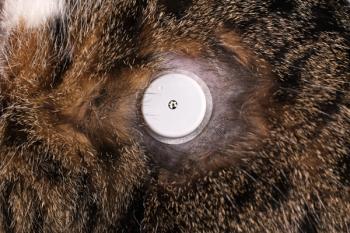
- dvm360 August 2019
- Volume 50
- Issue 8
Canine diabetes: Potentially pivotal pilot study under way
A new trial led by a Tufts veterinary professor is evaluating whether a long-acting insulin can control diabetes in dogs more effectively (and give their owners a whole lot more freedom).
Diabetes in small animals is a very treatable condition. What's not so easy is managing the disease on a day-to-day basis. Like people, most pets with diabetes require at least daily injections of insulin to process glucose and avoid complications from hyperglycemia.
It's a big commitment on the owner's part, notes Orla Mahony, MVB, DACVIM, a clinical assistant professor at Cummings School of Veterinary Medicine at Tufts University, in a
A new clinical trial from Tufts University Cummings Veterinary Medical Center may change all that. The trial is evaluating the effectiveness of an ultra-long-acting insulin in controlling glucose levels in dogs using only a single weekly injection.
“If it's successful, owners could give their pets an injection just once a week, removing the need to be home at the same time every day,” Dr. Mahoney says in the blog post. “And although the majority of pets take their shots without a bother, some really fight them, so reducing the number of injections would improve quality of life for these animals and their owners.”
To enroll in the trial-which is part of a multi-institutional study that includes the University of Georgia, Louisiana State and the University of California, Davis, along with Tufts-dogs must have stable diabetes and no other health concerns. After a week of glucose monitoring, eligible dogs will receive up to four weekly injections of the new insulin, with a final study visit a week after the last injection. If it's effective in the pet, owners will have the option of continuing to use the insulin at home for a year after the trial ends.
Dr. Mahony tells dvm360 that one dog, Olaf, has completed the study and is staying on the long-acting insulin for now, while another is just starting the trial and others are being screened. The goal is to enroll 10 dogs in the pilot and to launch a similar trial designed for cats later this summer.
Both insulins were created by a Massachusetts biopharmaceutical company that develops products for human and veterinary medicine. According to Dr. Mahony, commercially available long-lasting insulins in human medicine control blood sugar levels for only two or three days.
To learn more about the diabetes clinical trials at Cummings School of Veterinary Medicine, visit the
Articles in this issue
over 6 years ago
Heartworm hotspots: When pet travel is the troubleover 6 years ago
Slow growth to the freestanding hospitalover 6 years ago
Say cheese, Mr. Vice President!over 6 years ago
Sunday hours: Worth it or the wrong fit?over 6 years ago
Food for thought: New data on nutrition for veterinary clientsover 6 years ago
Penn Vet to run cannabis clinical trial for arthritic dogsover 6 years ago
Pin the competition: How to make market share to work for youover 6 years ago
The bright side of pet nutrition: Food and the human-animal bondNewsletter
From exam room tips to practice management insights, get trusted veterinary news delivered straight to your inbox—subscribe to dvm360.




